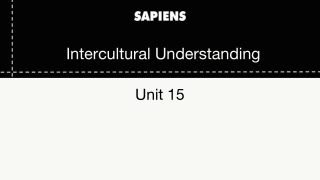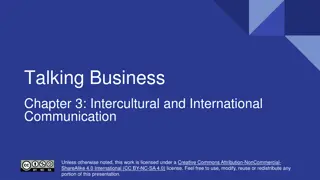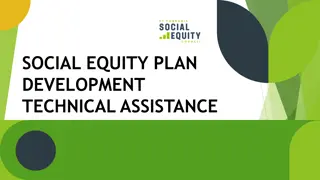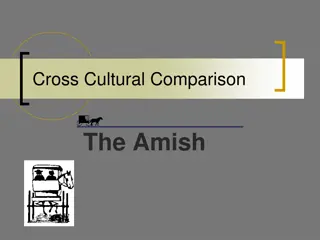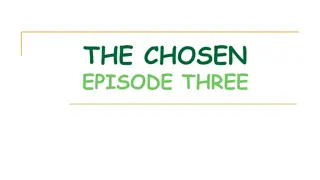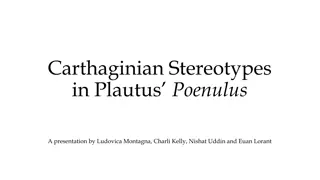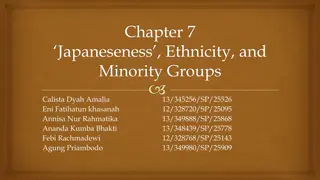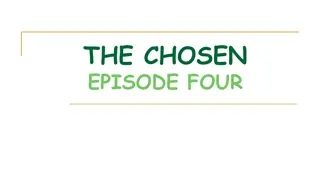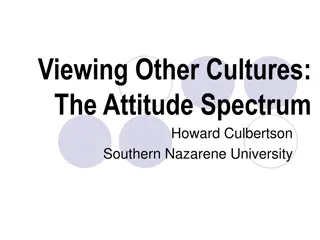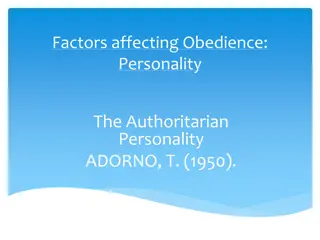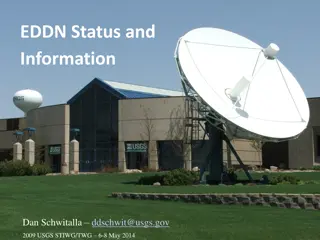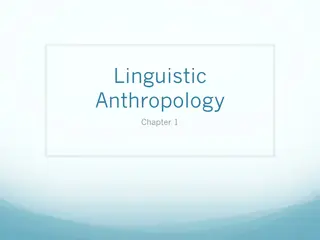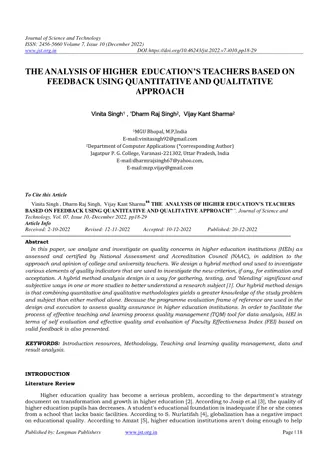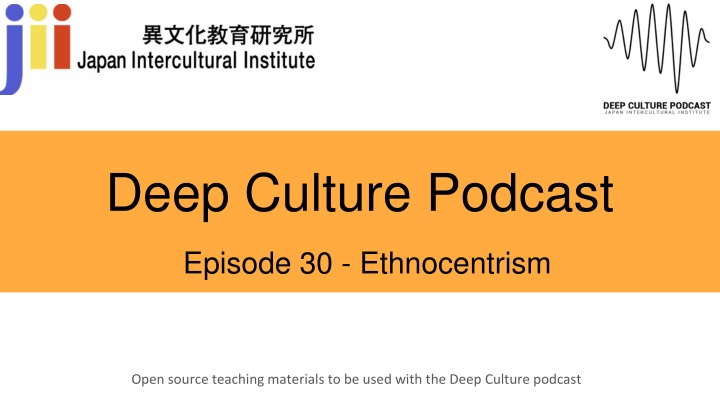
Exploring Ethnocentrism in Deep Culture Podcast Episode 30
Dive into the complexities of ethnocentrism with insights from brain and mind sciences in Deep Culture Podcast Episode 30. Learn about the learned vs. natural aspects, and cultural self expansion through language learning.
Download Presentation

Please find below an Image/Link to download the presentation.
The content on the website is provided AS IS for your information and personal use only. It may not be sold, licensed, or shared on other websites without obtaining consent from the author. If you encounter any issues during the download, it is possible that the publisher has removed the file from their server.
You are allowed to download the files provided on this website for personal or commercial use, subject to the condition that they are used lawfully. All files are the property of their respective owners.
The content on the website is provided AS IS for your information and personal use only. It may not be sold, licensed, or shared on other websites without obtaining consent from the author.
E N D
Presentation Transcript
Deep Culture Podcast Episode 30 - Ethnocentrism Open source teaching materials to be used with the Deep Culture podcast
Acknowledgements These materials were created as part of a collaborative project by the Japan Intercultural Institute. They are open source and can be freely used. Special thanks to a dedicated team of educators from different countries that contributed to this project. Contributors include: Sanne Bosma, Tannistha Dasgupta, Meena Eswaran, Jane Everett, Rob Fritz, Grazia Ghellini, Katarzyna Grzesik-Harz, Valerie Hansford, Jessica Janda, Christina Kapaun, Corazon Kato, Kasia Kucharska, Isabelle Al-Haj Johnston, Zeina Matar, Lynne Murphy, Lucile Roberts, Jo Thomas, Marie Tseng, and Revathi Viswanathan. To find out more about the project, see here. For questions, comments or participating in JII activities, contact: info@japanintercultural.org.
Module Structure Episode Overview: Summary, link, key themes Opening Discussion: Are you ethnocentric? Part 1: Reporting the Facts - Key ideas / insights Part 2: Naturally Ethnocentric - Key ideas / insights Part 3: Paradigm Shift - Deeper Understanding Digging Deeper
Episode summary Is ethnocentrism learned from our environment? Is it a natural part of how our mind works? Many intercultural educators believe that ethnocentrism is learned . . . but is this true? In this month s Deep Culture Podcast, Emre Seven and Joseph Shaules explore what brain and mind sciences can tell us about ethnocentrism. We hear about caste labeling from Ishita Ray, and Daniel Glinz tells us how language learning can expand our cultural self.
Listen to the episode: https://japanintercultural.org/podcast/episode-30-ethnocentrism/ Read the transcript: https://japanintercultural.org/wp- content/uploads/2023/05/S03E30_Ethnocentrism_Transcript.pdf
Key themes Listen for the following themes: Part 1: Reporting the Facts Part 2: Naturally Ethnocentric Part 3: The Paradigm Shift
Opening Discussion: Are you ethnocentric?
Opening Discussion (06:46) I remember years ago I noticed my own ethnocentrism at breakfast when I was traveling in France.[...] (6:57) The tour guide had mentioned that there was a buffet breakfast, which I was really excited about. But when I approached the table, I see there is only croissant, coffee and cheese. And I thought, is that all? Man, that's no buffet! (Image source: https://unsplash.com/photos/a-table-full-of-food-P_Qf5AHqLh8 )
Quick Understanding 1. What was served for breakfast when Emre visited France? 2. What was Emre s reaction when he saw the breakfast buffet? Why?
Share your thoughts . . . 1. What image comes to your mind when you think of breakfast? What breakfast foods from other cultures are not typical for you? 2. Have you had a negative impression about foreign things (such as food/customs)? What happened? How did you feel? 3. Have you experienced anyone else make a negative judgment about your culture? What happened? How did you feel?
Part 1: Reporting the facts Key ideas / insights
Key idea: What is ethnocentrism? (4:55) Joseph: Merriam Webster defines ethnocentrism as the attitude that one's own group ethnicity or nationality is superior to others. *** (6:26) Emre: And that is ethnocentrism, looking at things through the familiar lens of our previous experience and cultural worldview.
Exploring key idea: What is ethnocentrism? (08:10) Joseph: So, from the anthropological point of view, this is at the core of ethnocentrism - the feeling that what is familiar to me is normal and anything else is somehow wrong or not up to standard. It has also been defined as a bias or tunnel vision in which an individual views the world from the perspective of his or own group, establishing the in-group as archetypal and rating all other groups with reference to this ideal . What is ethnocentrism from an anthropological point of view? Why is ethnocentrism also referred to as tunnel vision ?
Check your understanding! Which of the following is true about ethnocentrism? (a)What is familiar to me feels right. (b)Familiar things feel boring to me. (c)I dislike things that feel normal.
Key insight: Ethnocentrism feels like reporting facts (9:59) Joseph: Somehow when we are making ethnocentric judgments, we feel like we are just reporting the facts. But often there's a negative value judgment involved.
Exploring key insight: Reporting the facts (9:59) Joseph: One odd thing about ethnocentrism is how invisible it often is. Somehow when we are making ethnocentric judgments, we feel like we are just reporting the facts. But often there's a negative value judgment involved. [...] (10:21) Emre: Yes, but I also have seen something else. We sometimes make ethnocentric judgments against our own society or community. *** (10:44) Joseph: Ethnocentrism is grounded most fundamentally in the unconscious assumption that there is a single standard by which things are judged. Emre: If there's a single standard of right or normal, you don't recognize that your perceptions depend on your previous experience. What does it mean to say ethnocentrism is invisible to us? Why don t we recognize that we are judging from our previous experience?
Check your understanding! Ethnocentrism can feel like reporting the facts because: (a)It has a negative value judgement. (b)It is an unconscious judgement. (c)It is always against other groups.
Check your understanding! What is the unconscious assumption behind ethnocentrism? (a)That no one knows everything (b)That we need to respect others opinions (c)That there is a single standard to judge by
Part 2: Naturally Ethnocentric Key ideas / insights
Key insight: Ethnocentrism is natural (12:14) And ethnocentric reactions are a natural result of predictive processing because our expectations about how the world works or how it should work come from our previous experience.
Exploring key insight: Ethnocentrism is natural (11:49) Joseph: Our mind navigates the world using internal models. We're constantly making unconscious predictions about what we experience. And the world is often a predictable place. So when you flip the switch, the light comes on, it's all automatic. Emre: If every time we saw a light switch, we had to think about turning on the light, we would constantly be overwhelmed. Joseph: So instead, we're constantly anticipating what will happen next. And ethnocentric reactions are a natural result of predictive processing because our expectations about how the world works or how it should work come from our previous experience. What is predictive processing? How is it useful? How is predictive processing a starting point for ethnocentrism?
Check your understanding! How does predictive processing help us navigate in the world? (a)It helps us think carefully about what will happen next. (b)It helps us forget our previous experiences. (c)It helps us make quick predictions in an unpredictable world.
Check your understanding! Why is ethnocentrism natural ? (a)Because it s a result of predictive processing. (b)Because it s natural for us to feel overwhelmed. (c)Because we often are unsure what to do.
Key insight: Ethnocentrism is a collective survival mechanism (16:46) The fact is ethnocentrism often feels good. It gives a sense of security and solidarity in a hostile world filled with others .
Exploring key idea: Ethnocentrism is a collective survival mechanism (16:46) And yet ethnocentrism is natural, a collective survival mechanism. It is the glue that holds communities together. [...] The fact is ethnocentrism often feels good. It gives a sense of security and solidarity in a hostile world filled with others . I for example, grew up surrounded by the idea that I have a right to condescend the language of my neighbors. [...] (18:09) That s the idea that my language is the standard was reinforced then casually invalidating other languages, we were invalidating the lived experiences of the people of those communities. And because our ethnocentric instinct is primordial, so visceral, it becomes a breeding ground for prejudice. How does ethnocentrism act as a collective survival mechanism ? How does ethnocentrism become a breeding ground for prejudice ? Explain or illustrate with an example from the clip.
Check your understanding! How does ethnocentrism act as a collective survival mechanism ? (a)It creates solidarity with other communities. (b)It gives a sense of security in a hostile world. (c)It creates good relationships with people we don t know.
Part 3: The Paradigm Shift Deeper Understanding
Deeper understanding Joseph: (23:10) We can learn to look at the world with new cultural glasses. It's possible to undergo a kind of paradigm shift. We experience a fundamental change to how we view the world. Emre: And rather than judging things from one absolute standard, we learn to accept and respect that there are other ways of looking at things. ***** Emre: (24:46) Well, one simple insight that has been powerful for me is that cultural learning is the process of pattern recognition. Joseph: So when we're in a familiar environment, we can easily read the patterns around us. But in a foreign environment, our normal interpretive frameworks don't work. So how do we make sense of these new patterns? Emre: And the ethnocentric answer is that we continue to use our existing interpretive schema. We judge new patterns based on our familiar standards. Joseph: But it's also possible for us to somehow create a new, seemingly separate mental structure and alternative set of interpretive patterns.
Check your understanding What is the paradigm shift that can happen because of cultural learning? a) Using existing schema to interpret foreign experiences. b) A fundamental change in how we see the world. c) Using an absolute standard to make sense of things.
Check your understanding How is cultural learning a form of pattern recognition ? a) Foreign patterns make us curious about cultural difference. b) New cultural patterns stress us and prevent cultural learning. c) We learn new cultural patterns to make sense of foreign experiences.
Check your understanding What do we need to look at the world with new cultural glasses ? a) Create a different way of interpreting the things we experience. b) Judge new patterns based on familiar standards. c) Read the cultural patterns we are used to.
Digging deeper: (24:18) I remember a similar set of feelings when I returned from the US to Turkey. When I stepped in the airport in Istanbul, I felt like I was not the me who left from there four months ago, I came back as a new person with a new way of looking at the world. Why does having a foreign experience change the way we see our home / familiar environment? How have new/foreign experiences changed the way that you see the world? In your experience, how can foreign experience help us grow as people?
Digging deeper: (27:52) I was seven years old playing in the schoolyard with my friends. When I first heard it exclaimed that my family was from a certain caste. It caught me off guard. I had never heard it discussed at home. Why did others put me in a category that I didn't even know existed? It was deeply disturbing. I was angry. When have you or others you know been judged in ethnocentric/judgmental ways? How did you feel/react? What is your advice for someone in this situation?
Deep Culture Podcast Episode 30 - Ethnocentrism Open source teaching materials to be used with the Deep Culture podcast

